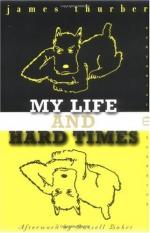|
This section contains 252 words (approx. 1 page at 400 words per page) |

|
A Note at the End Summary and Analysis
In the postscript to his memoir of youth, Thurber changes mood. He hints at hard times in his "middle years" about which he lacks the proper perspective to write, so he leaves off with the illusory peace as World War I ends. He refers obscurely to an event at one James Stanley's home in 1925 as too near to deal with; readers in 1933 and Thurber scholars might catch the reference and its importance, but the average reader must simply move on. While the preceding stories often include obscure references to people and the material objects of early 20th-century culture that can be understood in context and pictured in the mind from old movies, this reference is of a different sort.
Thurber goes on to gloss over his "mistaken exits and entrances" that lead him...
(read more from the A Note at the End Summary)
|
This section contains 252 words (approx. 1 page at 400 words per page) |

|




